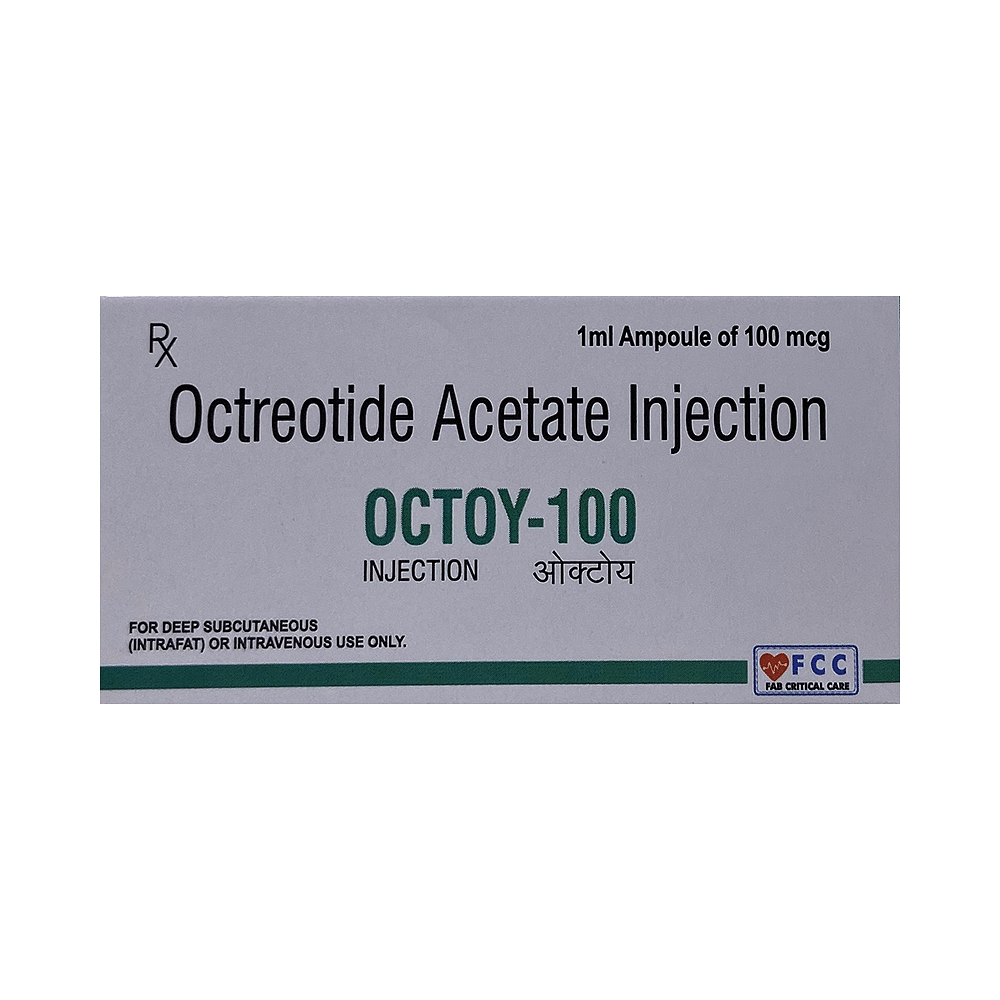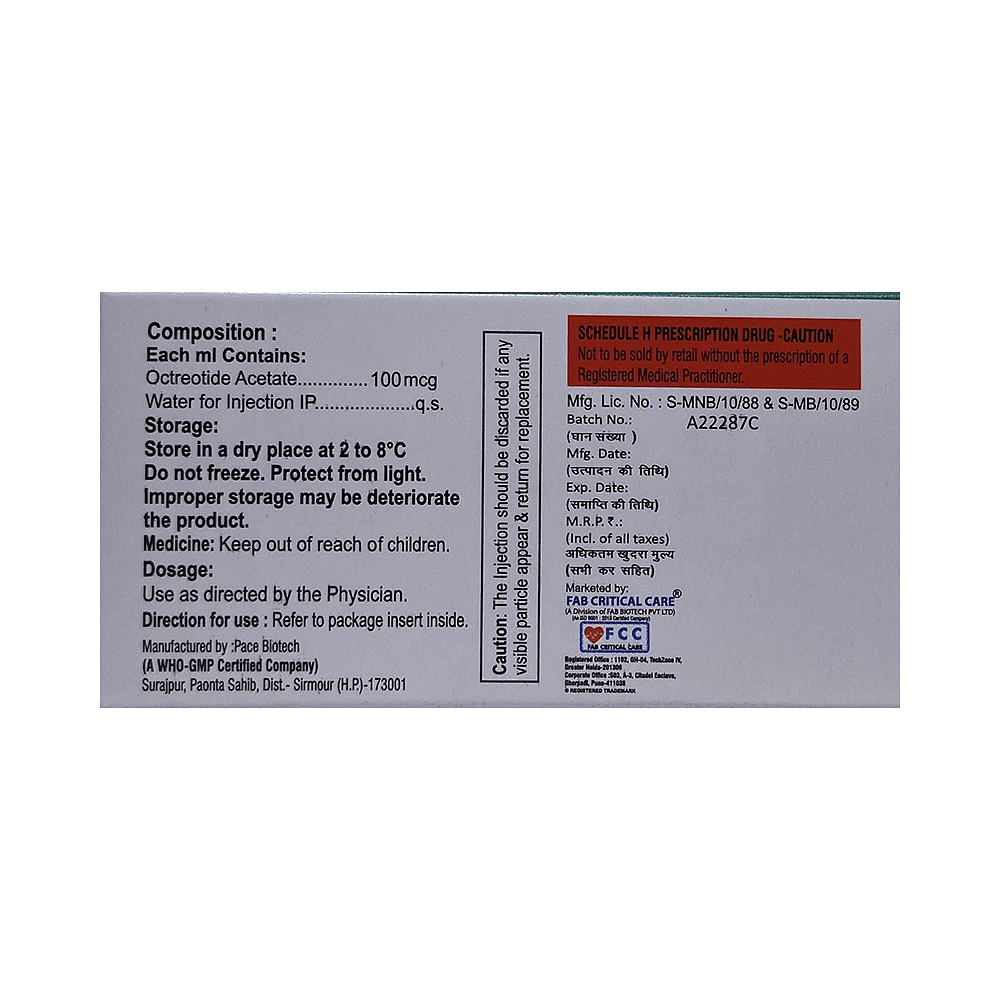

Octoy 100 Injection
Manufacturer
Fab Critical Care
Salt Composition
Octreotide acetate (100mcg)
Key Information
Short Description
Octoy 100 Injection is used to treat acromegaly, carcinoid tumors, and bleeding esophageal varices, and to prevent complications following surgery of the pancreas.
Dosage Form
Injection
Introduction
Octoy 100 Injection is generally given by a healthcare professional. You should not self-administer this medicine at home. Your doctor will decide the dose and how often you should take them. You should use it regularly to get the most benefit from the medicine. Do not stop using the medicine even if you feel better unless the doctor tells you so. Using this medicine may cause few common side effects such as diarrhea, abdominal pain, nausea, constipation, flatulence, and headache. Let your doctor know if any of these side effects do not go away or get worse. Before using this medicine, inform your doctor if you have problems with your liver. You should also tell your doctor all the other medicines you are taking.
Directions for Use
Your doctor or nurse will give you this medicine. Kindly do not self administer.
Safety Information
Side Effects
No common side effects listed.
Alcohol Warning
It is not known whether it is safe to consume alcohol with Octoy 100 Injection. Please consult your doctor.
Breastfeeding Warning
Octoy 100 Injection is probably safe to use during breastfeeding. Limited human data suggests that the drug does not represent any significant risk to the baby.
Pregnancy Warning
Octoy 100 Injection is generally considered safe to use during pregnancy. Animal studies have shown low or no adverse effects to the developing baby; however, there are limited human studies.
Interacting Medicines
Acarbose Chlorpropamide Glibenclamide Gliclazide
How it works
Octoy 100 Injection is a similar to somatostatin, a substance normally found in the human body which inhibits the effects of certain hormones such as growth hormone. It also lowers the bleeding from the food pipe by constricting (narrowing) the blood vessels.
Quick Tips
Octoy 100 Injection is given as an injection under the skin or into a vein. It may temporarily cause pain at the site of injection. You can relieve this by gently rubbing the site of injection for a few seconds afterwards. When used long term, your doctor may monitor your thyroid function, gallbladder function, liver function and vitamin B12 levels regularly. Inform your doctor if you are taking medicines to control your blood pressure or if you are diabetic. Women who do not wish to conceive should practice an effective method for contraception while taking this medication.
Frequently asked questions
What vital signs should I monitor while taking Octoy 100 Injection?
Seek immediate medical help if you experience lightheadedness, dizziness, fainting, chest pain or discomfort, slow or irregular heartbeat, trouble breathing, or unusual tiredness. These may be symptoms of heart rhythm problems.
I am experiencing nausea. Is this related to Octoy 100 Injection?
Nausea is a common side-effect of this medicine. Eating smaller, more frequent meals can help reduce the feeling of nausea. Avoid food that is salty, spicy, fried, or fatty.
Can Octoy 100 Injection cause thyroid disorders?
Yes, Octoy 100 Injection may suppress the secretion of thyroid-stimulating hormone, which can lead to hypothyroidism.
How does Octoy 100 Injection affect blood sugar levels?
Yes, Octoy 100 Injection may cause your blood sugar levels to rise or fall, leading to changes in insulin or other anti-diabetic medication dosages. Your doctor will advise on regular monitoring of your blood sugar while taking Octoy 100 Injection.
Does Octoy 100 Injection lead to diarrhea?
Diarrhea is a possible side effect of Octoy 100 Injection. Stick to simple meals, avoid rich or spicy food, and drink plenty of water while taking Octoy 100 Injection. Consult your doctor if you experience severe diarrhea.
Does Octoy 100 Injection cause constipation?
Yes, Octoy 100 Injection may cause constipation. Try to eat a well-balanced diet with plenty of fiber and drink enough water. Do not take laxatives without consulting your doctor.
I am experiencing a headache; is this related to Octoy 100 Injection?
Yes, headaches are a common side-effect of Octoy 100 Injection. Rest, drink plenty of water, and ask a pharmacist for advice on suitable painkillers. If the headache persists, speak with your doctor.
How will I know if Octoy 100 Injection is working?
Regular scans will determine whether your tumor responds to treatment. Your doctor will decide when these scans should be conducted.


